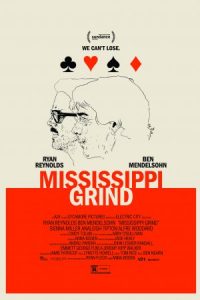“Gerry, it don’t get any better than this.”
One of the reviews for our latest choice for Gambling in the Movies, from Melbourne radio station 3AW, said that “all good films about gambling are, in essence, anti-gambling films.” Based on the diverse collection of films we’ve reviewed until now in this series, I’m inclined to agree. But does a gambling movie have to end with financial ruin in order to be anti-gambling? Pictures like Owning Mahowny (2003) and The Gambler (1974) made a point of putting a monetary bottom-line on the costs of their protagonists’ Gambling Disorder. Even our favourite up-beat gambling flick, 21 (2007), crowbars a robbery scene into the climax, in order to make sure that the protagonist doesn’t walk away with all the cash. But a focus only on the financial side of Gambling Disorder can lead us to overlook some of the other harms: family, relationships, work and health. This is one of several ways by which Mississippi Grind (2015) separates itself from the rest of the gambling film genre.
films about gambling are, in essence, anti-gambling films.” Based on the diverse collection of films we’ve reviewed until now in this series, I’m inclined to agree. But does a gambling movie have to end with financial ruin in order to be anti-gambling? Pictures like Owning Mahowny (2003) and The Gambler (1974) made a point of putting a monetary bottom-line on the costs of their protagonists’ Gambling Disorder. Even our favourite up-beat gambling flick, 21 (2007), crowbars a robbery scene into the climax, in order to make sure that the protagonist doesn’t walk away with all the cash. But a focus only on the financial side of Gambling Disorder can lead us to overlook some of the other harms: family, relationships, work and health. This is one of several ways by which Mississippi Grind (2015) separates itself from the rest of the gambling film genre.
It opens with a tall rainbow over Dubuque, Iowa, where Gerry works as a struggling realtor with mounting gambling debts. Gerry (Mendelsohn) has a number of chance encounters with Curtis (Reynolds), a charming rambler, and the two become friends. After a tense lunch meeting with his loan shark, Gerry feels Dubuque closing in around him and, meeting Curtis again, entices him to join up for a long and winding trip down the Mississippi towards their big score: a high-stakes game at Tony Roundtree’s place in New Orleans.
I would say that the real strength of this movie is the even-handed portrayal of Gerry’s gambling and its impact on his life. For much of the movie, Gerry is pre-occupied with seeking out ‘signs’ of a good bet. Whether it’s a rainbow, a seemingly endless hot streak or a crucial tell on the other player’s face, Gerry believes that the universe is showing him the patterns that he needs to beat random chance. Gambling has caused him a great deal of financial instability, leading him to beg, borrow and steal in order to continue betting. In doing so, Gerry has alienated himself from coworkers, his ex-wife, and his daughter.
Mississippi Grind does a great job of showing many of the maladaptive cognitions associated with problem gambling. There is a wonderful example of what psychologists term Counterfactual Thinking: when Gerry wins at the dog track, his elation is cut short by the sudden realization that he could have won much more money had he bet on the dog to win, rather than merely to place. Curtis tries to curtail this reaction in Gerry, telling him that winning more wouldn’t make him happier. His distraught reaction to an objectively positive outcome occurs because he can’t help but think of how the situation could have been even better.
[WARNING: Major spoilers to follow]
The film’s climax erupts in New Orleans following a bad beat in Memphis and a falling out with Curtis in Tunica, Mississippi. Gerry finds himself down and out after losing on a small stakes slot machine with a rainbow theme. Feeling left behind by Curtis and the mystical signs he had followed so far, he sells his car and returns to the casino to play blackjack. Down to their last dollars, Curtis’ and Gerry’s luck turns around, propelling them on a winning streak that defies all of Gerry’s ideas about the predictability of the games. Ultimately, Gerry and Curtis stake $280,000 on a single dice roll. The scene fades to black, but in the next scene, Curtis is breaking into a huge lobster, proclaiming his love for the United States of America. They’ve won half a million dollars. Again, though, Gerry’s elation is short-lived. He says that his steak doesn’t taste quite right, but Curtis doesn’t agree. Gerry has turned a corner. Betting so much money on pure random chance just didn’t sit right. It seems as though his gambling days are over – at least for now — and he buys back his car and sets course for Little Rock, to make things right with his daughter.
Despite the serious tone of this review, this movie is a lot of fun. It’s gripping, funny, well-paced and drenched in the feel and sound of the Mississippi Delta. I am so pleased that it can be the new high-water mark for gambling films in our lab.
For fair portrayal of disordered gambling, our lab rated Mississippi Grind 4.5/5
As a film, we rate it 4.5/5
Reviewed by Spencer Murch, June 2016. email spencer@psych.ubc.ca